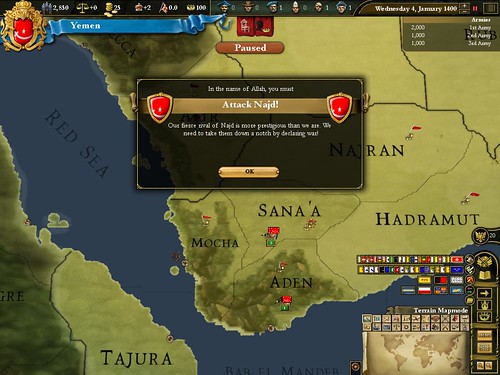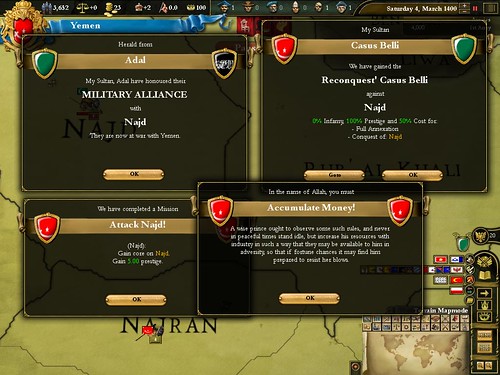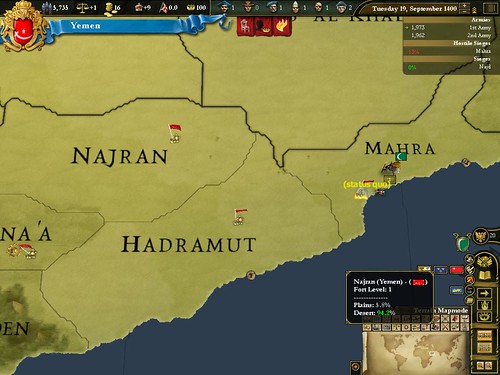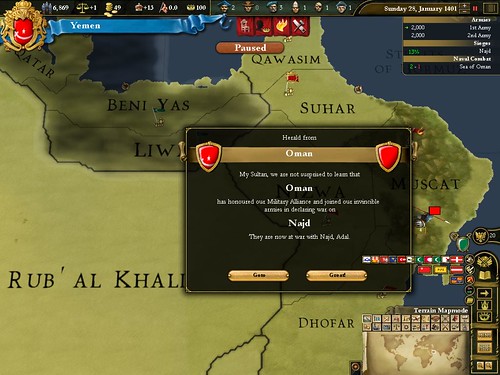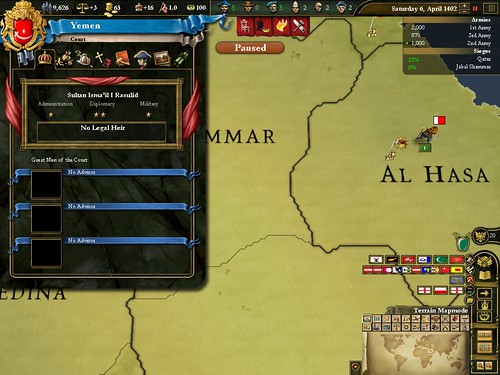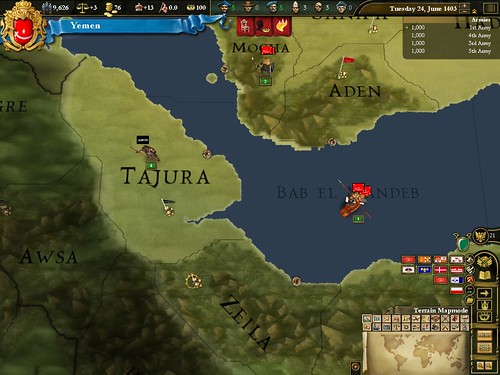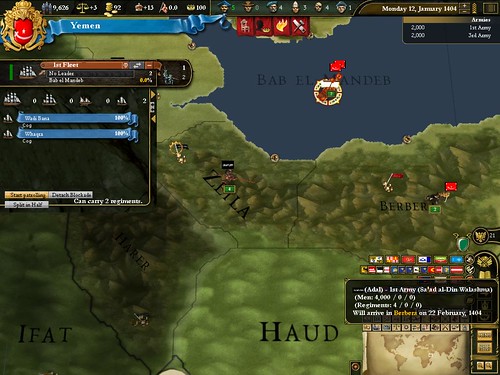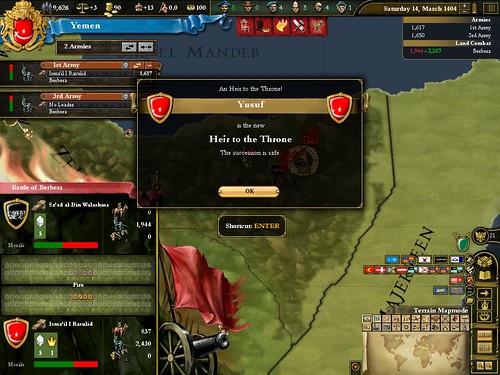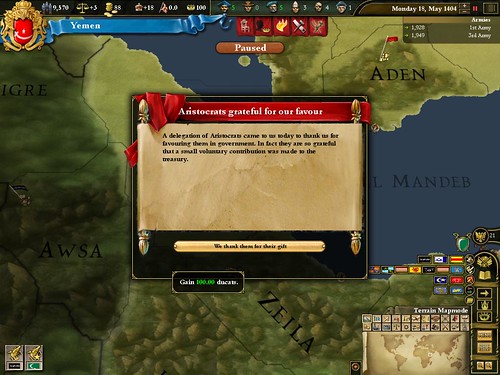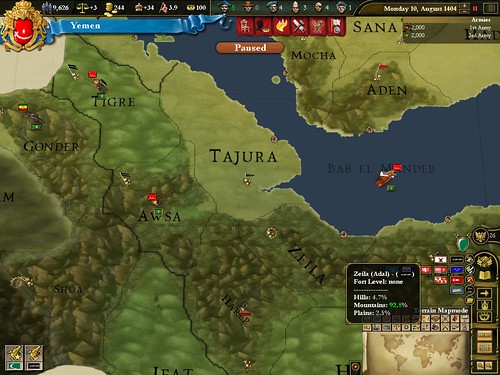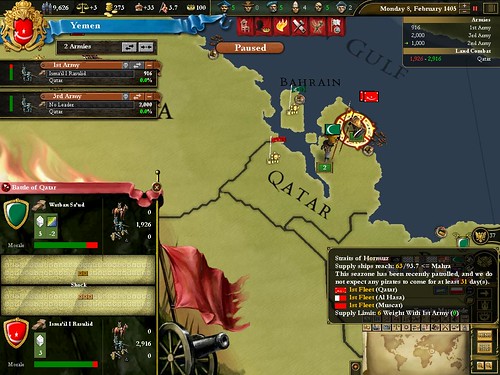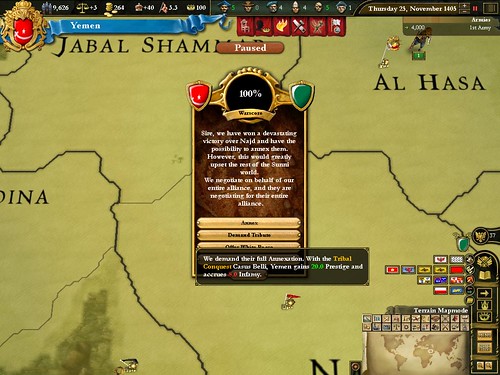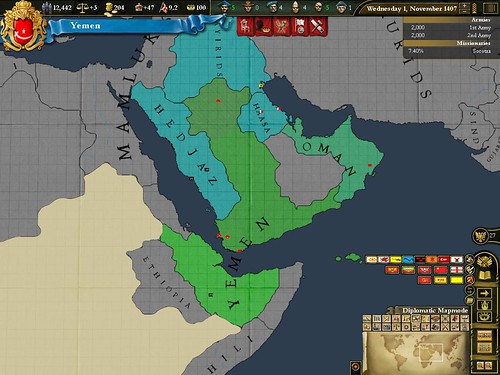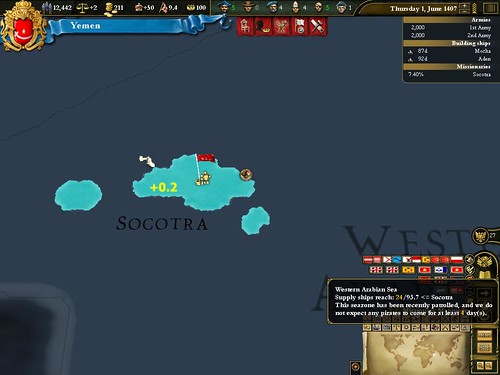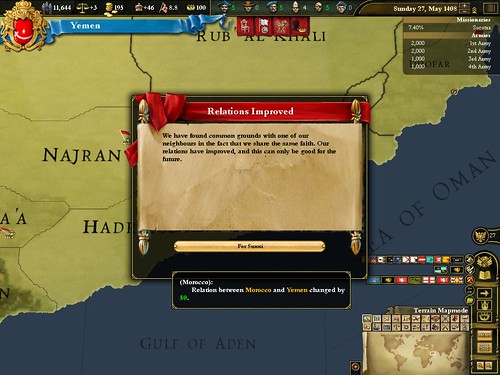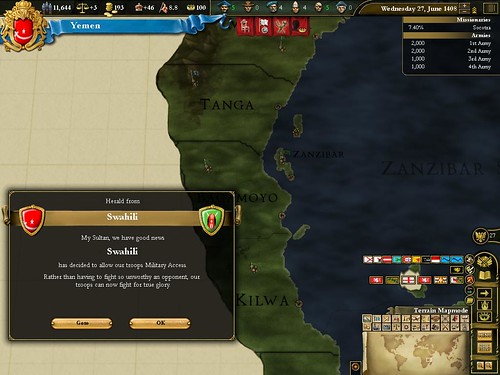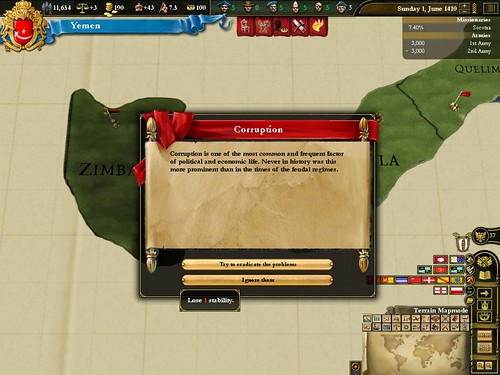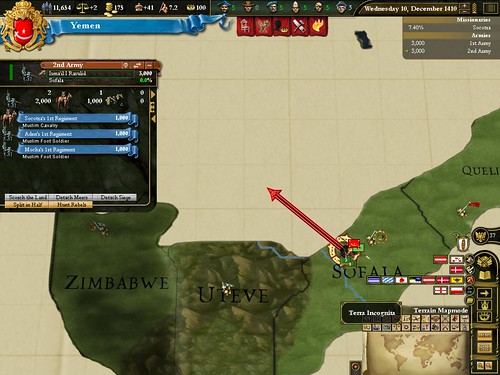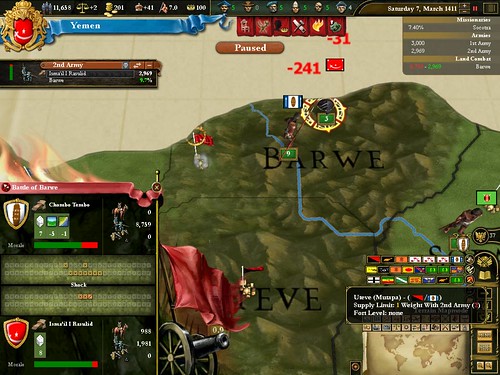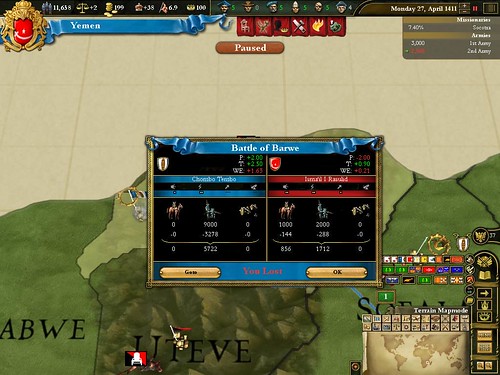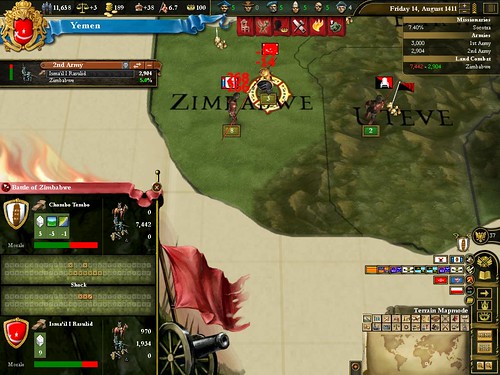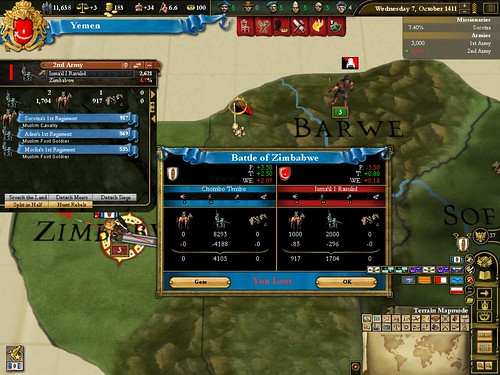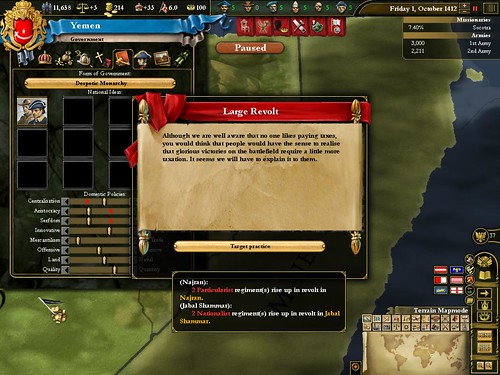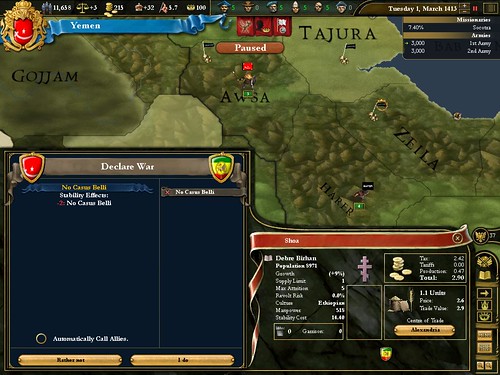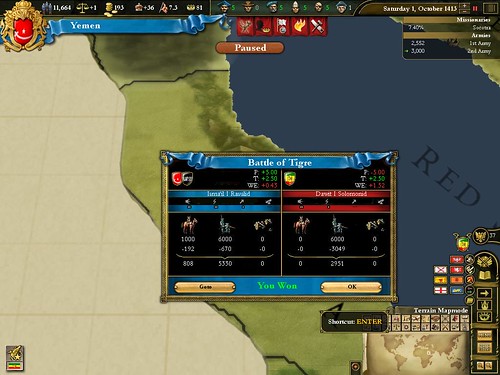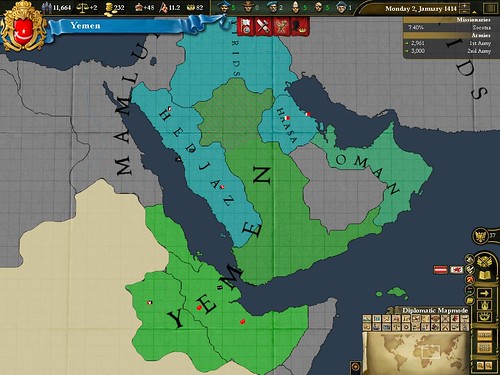The Messengers - A Yemeni DW AAR
**Writer notes**
The Messengers - A Yemeni AAR
This AAR has a dramatic start, but will be a mix of narrative, newbie-ish advice seeking, and gameplay. It's my first AAR and I'm a fairly new player, so I probably should do England or something. But I loved the idea of Yemen for my current skill level. It's poor and weak with awful sliders, but fairly isolated from the big scary guys with room to expand.
I've already completed the first 15 years of gameplay, but past that will be looking for help, especially economically! Damn Arabia, why you so poor?
Anyway, some basics.
Rules:
-No restarts, with the only exception of stupid n00b “what does this button do?” mistakes that wreck things in a non-fun way. There might be some of those.
-Normal everything, Lucky Nations off.
Objectives:
-Unite all Arab provinces under one banner, making a pan-Arab state. Turks and Berbers are in the same culture group, but I'm not sure if I want to go that route. Cross that bridge when I come to it.
-Convert all Arab provinces to Sunni and core them, making a unified Sunni Arab state.
-Once conquest time is over, capitalize on being in the center of everything to dominate trading.
-Westernize and build Universities to again make the Arab world the center of scholarship.
-Become Defender of the Faith and keep the Europeans out of Islamic lands.
-Since the nation should stay Arab, I can vassalize others, pillage their treasures and break up their countries, but I shouldn't acquire cores on non-Arab lands. If I decide to keep a non-Arab province, I have to Enact Settlement Policy on it as soon as possible to Arabize it! Which means I won't be doing it much, because that decision is a nightmare.
-Colonization is okay because that's just spreading Arab culture around the globe!
Enough talk, on to the AAR!
Chapter 1: The First Messenger
12 Safar 802 A.H
Heretics and barbarians, nothing more.
Sultan Isma'il Rasulid took a long, slow pull from the huqqa pipe beside his bed. Reclining back, he examined the parchment map in his hand with a mixture of irritation and disgust. He had been ruling Yemen for the last 23 years, and nothing had changed.
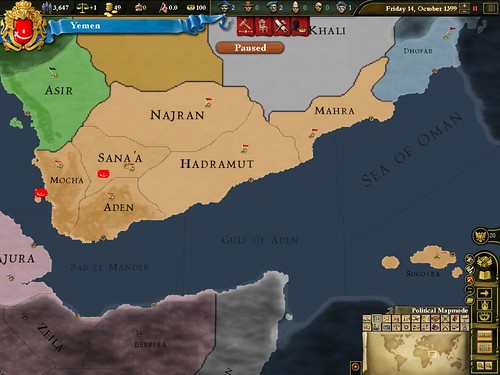
Isma'il had dedicated his life not only to ruling Yemen, but also documenting the general history of the country and the region. Ever since the decline and fall of Abbasid authority, the Arab people had fallen with it into a fractured puzzle of tribal alliances and petty squabbles, endlessly feuding like children over the breaking pieces of their formerly glorious culture.
Meanwhile, word had even reached the far corner of Yemen that the stinking, milky-colored Europeans were starting to turn the tides. Surely the Turks were doing their part in taming the beasts, but al-Andalus had all but fallen. The Abbasid Golden Age of scholarship--Jabir ibn Hayyan's alchemy, Al-Kwarizmi's mathematics, Al-Haytham's optics, Al-Battani's astronomy, and the thousand-petaled achievements of Abdullah ibn Sina—had long since passed, and the dirty northern barbarians were ransacking Arab knowledge and beginning to slowly catch up.
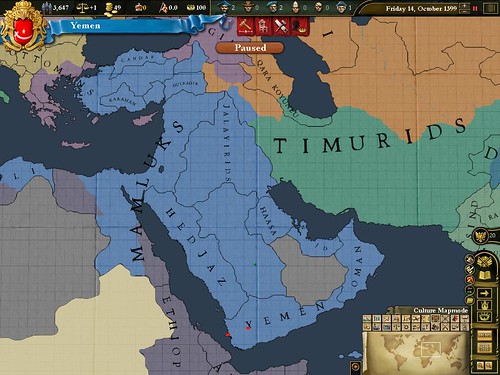
In their current state, the Arabs were likely to decline as the Western powers grew. The tribal bloodlines were too weak and unstable, while the monarchies and republics of Europe provided a fertile feeding ground for progress. The Arab tribal chiefs, like Babylon's Belshazzar, should be able to see the writing on the wall. But by all accounts they were clueless to the looming threat, growing more decadent and regressive by the hour.
Only Yemen had, in the fall of the Abbasids, maintained a semblance of dynastic order. 220 years ago Isma'il's distant ancestor, the Turkman Muhammad ibn Harun, had worked as a messenger for the Abbasid caliph and was sent to settle in south Arabia. The locals called him “Rasul”--Arabic for “messenger”--and he soon felt at home. His son Ali governed the holy places at Mecca, and his grandson Umar ibn Ali founded the Rasulid family rule over Yemen. Over the years they had become more Arab than Turkman, and were truly Arab anyway, being descendents of the great patriarch Qahtan in the dark years before Allah had liberated the Arabs from their lowly pagan state.
As the Caliphate crumbled into tribal chaos, the Rasulids had maintained their royal dignity alone.
Well, almost alone. . . there were some neighbors to consider. . . Isma'il regarded the map.
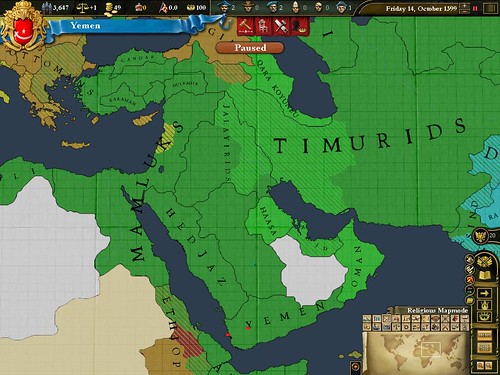
To the northeast was the only other dignified kingdom of Arabia, Oman. Worldly traders, they would be a great hope, if not for their awful heretical interpretations and practices. The Ibadis (too often confused by the ignorant to be Shi'a) had been perverting the words of the Prophet since barely a hundred years after his death. They had the good sense to keep to themselves about it, unlike the aggressive Shi'a, but it still made him keep them at arm's length.
Those who believed that even Muslims could be destined for eternal hellfire (as opposed to the obviously sensible temporary cleansing hellfire in which true Muslims believed) were obviously too judgmental and unstable to be considered true brothers. Not to mention the number of reliable hadith that they, so pickily, chose to ignore and deny. It is one thing to be rigorous: another to be denialist.
Doctrinal issues aside, however, they were decent neighbors to the Yemeni people, but too strange to lead the Arabs back into a new Golden Age.
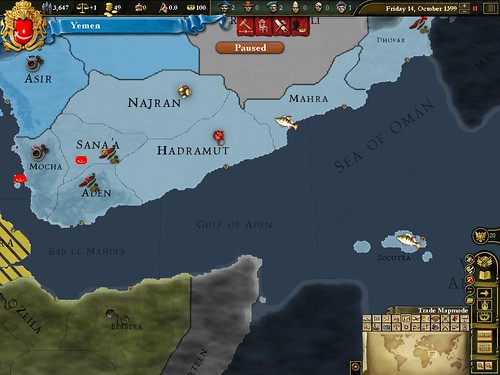
To the south, across the Gate of Grief (Bab Al-Mandeb), the Adal Sultanate had also maintained the Sunni faith and a dynasty. Unfortunately, that was all they had maintained in their brief time, as the Somalis were pious but not learned, and their powers were unlikely to ever reach beyond the Horn of Africa due to their lack of interest in progress.
To the east was only a pile of tribal feuds, growing more retrograde and bitter each year, until the realms of the Ottoman Turks. The steppe hordes of Timur Khan raged in Persia, leaving towers of skulls and ransacking Persian knowledge recklessly. Najd, the Jalayrids, puny Haasa, and Hedjaz all scratched and scraped with each other over Arabia, looting its corpse for riches.
And then, to the west, were the Mamluks. Isma'il narrowed his eyes at the map, puffing angrily.
The very same sheikhs who, though they professed to be good Muslims, had kidnapped his grandfather al-Mujahid Ali while on his hajj to Mecca. The very same sheikhs who held him prisoner for a year, humiliating the house of Rasulid and inspiring their domestic enemies to grow bolder, and encouraging the traders that once flocked to Aden to instead sail on to Jeddah. The Mamluks held their large empire—the bustling al-Azhar of Cairo, the jewel of Alexandria, the Dome of the Rock in Jerusalem—with a great show of force, but no dynastic dignity or scholarship. Their cruel armies were only a shadow of the true sultan—authority--which was needed to lead the Arabs to their inner greatness.
Isma'il put down the map and removed the pipe from his lips. This was what was needed, truly. If the Arab people were to resist the brewing rise of the West, someone would have to revive their spirits and unite them. But the map was only a mess of heresy, clannishness, and backwardness.
There really was nobody else.
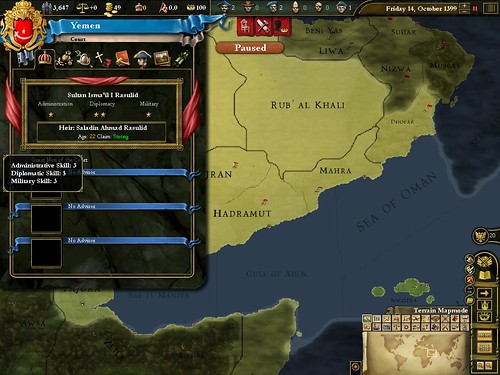
He was getting on in years, though he still had some strength left. His son, Saladin Ahmad, was a young man now who could rule, though he seemed more fit for the foreign service than for rulership at times. . .
Standing up, Isma'il walked to the window and looked out over the city of Aden. He hated that he knew the city, which had known peace for decades now, would be put to the hard and painful work of building glory. He knew Yemen's delicate economy, based on trading coffee and spices from its arid provinces, couldn't take the strain. But it had to be done. Isma'il had studied history, and knew that if noone else would unite the Arabs into a whole body, their limbs would be picked on by the hungry vultures from the West in due time.
Yet the Arabs remained uninformed, and so the Rasulids, the messengers of the Abbasids, were overdue to deliver their message of revival and awakening.
In the distance, the sun was setting, but the moon was rising. A muezzin called out from a minaret, summoning the people to their maghrib prayers.
Turning from the window, he headed for the qibla corner of his chamber, pointing towards the Mecca his dynasty once governed. He glanced at the pile of maps again, steadied his nerves, and went to pray.
**Writer notes**
The Messengers - A Yemeni AAR
This AAR has a dramatic start, but will be a mix of narrative, newbie-ish advice seeking, and gameplay. It's my first AAR and I'm a fairly new player, so I probably should do England or something. But I loved the idea of Yemen for my current skill level. It's poor and weak with awful sliders, but fairly isolated from the big scary guys with room to expand.
I've already completed the first 15 years of gameplay, but past that will be looking for help, especially economically! Damn Arabia, why you so poor?
Anyway, some basics.
Rules:
-No restarts, with the only exception of stupid n00b “what does this button do?” mistakes that wreck things in a non-fun way. There might be some of those.
-Normal everything, Lucky Nations off.
Objectives:
-Unite all Arab provinces under one banner, making a pan-Arab state. Turks and Berbers are in the same culture group, but I'm not sure if I want to go that route. Cross that bridge when I come to it.
-Convert all Arab provinces to Sunni and core them, making a unified Sunni Arab state.
-Once conquest time is over, capitalize on being in the center of everything to dominate trading.
-Westernize and build Universities to again make the Arab world the center of scholarship.
-Become Defender of the Faith and keep the Europeans out of Islamic lands.
-Since the nation should stay Arab, I can vassalize others, pillage their treasures and break up their countries, but I shouldn't acquire cores on non-Arab lands. If I decide to keep a non-Arab province, I have to Enact Settlement Policy on it as soon as possible to Arabize it! Which means I won't be doing it much, because that decision is a nightmare.
-Colonization is okay because that's just spreading Arab culture around the globe!
Enough talk, on to the AAR!
Chapter 1: The First Messenger
12 Safar 802 A.H
Heretics and barbarians, nothing more.
Sultan Isma'il Rasulid took a long, slow pull from the huqqa pipe beside his bed. Reclining back, he examined the parchment map in his hand with a mixture of irritation and disgust. He had been ruling Yemen for the last 23 years, and nothing had changed.

Isma'il had dedicated his life not only to ruling Yemen, but also documenting the general history of the country and the region. Ever since the decline and fall of Abbasid authority, the Arab people had fallen with it into a fractured puzzle of tribal alliances and petty squabbles, endlessly feuding like children over the breaking pieces of their formerly glorious culture.
Meanwhile, word had even reached the far corner of Yemen that the stinking, milky-colored Europeans were starting to turn the tides. Surely the Turks were doing their part in taming the beasts, but al-Andalus had all but fallen. The Abbasid Golden Age of scholarship--Jabir ibn Hayyan's alchemy, Al-Kwarizmi's mathematics, Al-Haytham's optics, Al-Battani's astronomy, and the thousand-petaled achievements of Abdullah ibn Sina—had long since passed, and the dirty northern barbarians were ransacking Arab knowledge and beginning to slowly catch up.

In their current state, the Arabs were likely to decline as the Western powers grew. The tribal bloodlines were too weak and unstable, while the monarchies and republics of Europe provided a fertile feeding ground for progress. The Arab tribal chiefs, like Babylon's Belshazzar, should be able to see the writing on the wall. But by all accounts they were clueless to the looming threat, growing more decadent and regressive by the hour.
Only Yemen had, in the fall of the Abbasids, maintained a semblance of dynastic order. 220 years ago Isma'il's distant ancestor, the Turkman Muhammad ibn Harun, had worked as a messenger for the Abbasid caliph and was sent to settle in south Arabia. The locals called him “Rasul”--Arabic for “messenger”--and he soon felt at home. His son Ali governed the holy places at Mecca, and his grandson Umar ibn Ali founded the Rasulid family rule over Yemen. Over the years they had become more Arab than Turkman, and were truly Arab anyway, being descendents of the great patriarch Qahtan in the dark years before Allah had liberated the Arabs from their lowly pagan state.
As the Caliphate crumbled into tribal chaos, the Rasulids had maintained their royal dignity alone.
Well, almost alone. . . there were some neighbors to consider. . . Isma'il regarded the map.

To the northeast was the only other dignified kingdom of Arabia, Oman. Worldly traders, they would be a great hope, if not for their awful heretical interpretations and practices. The Ibadis (too often confused by the ignorant to be Shi'a) had been perverting the words of the Prophet since barely a hundred years after his death. They had the good sense to keep to themselves about it, unlike the aggressive Shi'a, but it still made him keep them at arm's length.
Those who believed that even Muslims could be destined for eternal hellfire (as opposed to the obviously sensible temporary cleansing hellfire in which true Muslims believed) were obviously too judgmental and unstable to be considered true brothers. Not to mention the number of reliable hadith that they, so pickily, chose to ignore and deny. It is one thing to be rigorous: another to be denialist.
Doctrinal issues aside, however, they were decent neighbors to the Yemeni people, but too strange to lead the Arabs back into a new Golden Age.

To the south, across the Gate of Grief (Bab Al-Mandeb), the Adal Sultanate had also maintained the Sunni faith and a dynasty. Unfortunately, that was all they had maintained in their brief time, as the Somalis were pious but not learned, and their powers were unlikely to ever reach beyond the Horn of Africa due to their lack of interest in progress.
To the east was only a pile of tribal feuds, growing more retrograde and bitter each year, until the realms of the Ottoman Turks. The steppe hordes of Timur Khan raged in Persia, leaving towers of skulls and ransacking Persian knowledge recklessly. Najd, the Jalayrids, puny Haasa, and Hedjaz all scratched and scraped with each other over Arabia, looting its corpse for riches.
And then, to the west, were the Mamluks. Isma'il narrowed his eyes at the map, puffing angrily.
The very same sheikhs who, though they professed to be good Muslims, had kidnapped his grandfather al-Mujahid Ali while on his hajj to Mecca. The very same sheikhs who held him prisoner for a year, humiliating the house of Rasulid and inspiring their domestic enemies to grow bolder, and encouraging the traders that once flocked to Aden to instead sail on to Jeddah. The Mamluks held their large empire—the bustling al-Azhar of Cairo, the jewel of Alexandria, the Dome of the Rock in Jerusalem—with a great show of force, but no dynastic dignity or scholarship. Their cruel armies were only a shadow of the true sultan—authority--which was needed to lead the Arabs to their inner greatness.
Isma'il put down the map and removed the pipe from his lips. This was what was needed, truly. If the Arab people were to resist the brewing rise of the West, someone would have to revive their spirits and unite them. But the map was only a mess of heresy, clannishness, and backwardness.
There really was nobody else.

He was getting on in years, though he still had some strength left. His son, Saladin Ahmad, was a young man now who could rule, though he seemed more fit for the foreign service than for rulership at times. . .
Standing up, Isma'il walked to the window and looked out over the city of Aden. He hated that he knew the city, which had known peace for decades now, would be put to the hard and painful work of building glory. He knew Yemen's delicate economy, based on trading coffee and spices from its arid provinces, couldn't take the strain. But it had to be done. Isma'il had studied history, and knew that if noone else would unite the Arabs into a whole body, their limbs would be picked on by the hungry vultures from the West in due time.
Yet the Arabs remained uninformed, and so the Rasulids, the messengers of the Abbasids, were overdue to deliver their message of revival and awakening.
In the distance, the sun was setting, but the moon was rising. A muezzin called out from a minaret, summoning the people to their maghrib prayers.
Turning from the window, he headed for the qibla corner of his chamber, pointing towards the Mecca his dynasty once governed. He glanced at the pile of maps again, steadied his nerves, and went to pray.
Last edited:


